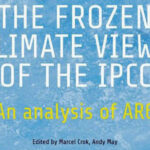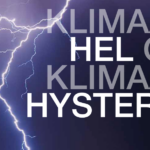
Roger Pielke sr plaatste vorige week mijn antwoorden aan het IAC Panel op zijn blog Climate Science. Inmiddels heeft hij zelf ook de vragenlijst van het IAC beantwoord. Een paar fragmenten:
I have had a long experience with the IPCC assessment process starting in about 1992.
As I have written on in papers and on weblog posts, which I will list some of below, the IPCC involves a top down management of the chapters. The 2007 Statement for Policymakers is a narrowly focused summary which was used to promote the perspective of climate variability and change of the organizers and leadership of the IPCC assessments.
I was asked to review several Chapters of the draft [for the 1992 Supplement]. I made a number of suggestions, including the need to introduce the role of land use/land cover change as an important regional and global climate forcing. My input was totally ignored without any response.
I was invited to be a contributing coauthor on the chapter on regional climate. Again, I prepared detailed input for the Report, and again all of my comments were ignored without even a rebuttal. At that point, I concluded that the IPCC Reports were actually intended to be advocacy documents designed to produce particular policy actions, but not as a true and honest assessment of the understanding of the climate system.
As a result of this second refusal to include peer reviewed scientific information, I called the IPCC and resigned from any further involvement in this clearly biased assessment process.
I was not invited to contribute to the more recent IPCC reports.
The summary of my experience with the IPCC is that it is managed with particular outputs in place before the assessments are even started. The Lead Authors have almost complete control with respect to what is accepted in their Chapter, and what is ignored.
The IPCC is actually a relatively small group of individuals who are using the IPCC process to control what policymakers and the public learn about climate on multi-decadal time scales.
Without new scientists leading the IPCC process as LAs and CLAs who are not assessing their own research work, the next IPCC report is doomed to continue to be completed by an oligarchy that is using its privileged position to advocate for a particular perspective on the role of humans within the climate system which conforms with their published research.
The next IPCC report will not be a balanced assessment, but continue to be real conflict of interest with policy advocacy in the guise of a scientific framework.
The IPCC WG1 Report clearly cherrypicked information on the robustness of the land near-surface air temperature to bolster their advocacy of a particular perspective on the role of humans within the climate system. As a result, policymakers and the public have been given a false (or at best an incomplete) assessment of the multi-decadal global average near-surface air temperature trends.
In the testimony I included an appendix which shows the cherrypicking in the chapters in the 2007 IPCC WG1 report by documenting what peer reviewed papers were ignored.
For example, in order to evaluate the IPCC’s claim to be comprehensive, we cross-compared IPCC WG1 references on near-surface air temperature trends with peer-reviewed citations. We selected only papers that appeared before about May 2006 so they were readily available to the IPCC Lead authors.
What we found were that peer reviewed papers that conflicted with the robustness of the surface air temperature trends were ignored in the 2007 IPCC WG1 assessment.
Governments are necessarily political which is one of the reasons the climate issue has become so polarized and assessment committees have been chosen to perpetuate a particular perspective.






Het IPCC is dus geen wetenschappelijke maar een politieke organisatie en de politici met een klimaatalarmistische achtergrond (of die daar anderszins belang bij hebben) grijpen de rapporten van het IPCC met beide handen aan om daarmee hun 'gelijk' te bewijzen.
En het gericht shoppen naar rapporten/informatie/disinformatie is niet specifiek voor het IPCC.
Vrijwel alle regeringen doen dat op grote schaal en zo ook de meeste instituties van de VN.
Eerst wordt een beoogde uitkomst gekozen en vervolgens shoppen ze tot ze een overdaad aan informatie hebben die dat beoogde doel ondersteunt. Ook al moeten daarvoor wat "aanpassingen" worden aangebracht in de resp. rapporten/informatie zodat deze uiteindelijk disinformatie worden.